Choosing a child-friendly dog breeds in india is crucial for ensuring a harmonious relationship between the dog and your family. In India, where families often live in close-knit communities, choosing the right breed can make a significant difference in daily life. A suitable dog can provide companionship, teach responsibility, and enhance the family dynamic.
This blog aims to guide parents in making an informed decision by highlighting the best dog breeds for children, considering factors such as temperament, size, and care requirements.
Factors to Consider When Choosing a Child-Friendly Dog Breed
When selecting a dog breed for families with children, several factors must be considered to ensure safety and enjoyment for both the kids and the pet.
Temperament
A gentle and patient dog is essential for families with children. Dogs with a calm demeanor are less likely to become aggressive and are better suited to handle the unpredictability of kids’ behavior.
Size
It’s important to balance manageability with robustness. Smaller dogs may be easier for children to handle but could be fragile, while larger dogs can be more tolerant of rough play but may accidentally knock over small children.
Energy Levels
Matching the dog’s energy levels with the family’s lifestyle is crucial. Active families may prefer high-energy dogs that can join in on outdoor activities, while more sedentary households may benefit from a calm, low-energy breed.
Grooming Needs
Consider the time and effort required for grooming. Some breeds need regular brushing and professional grooming, while others are low-maintenance. Families should choose a dog whose grooming needs fit their schedule.
Health
It’s important to be aware of common health issues and the lifespan of the breed. Opting for a breed with fewer genetic health problems and a longer lifespan can help ensure a longer, healthier relationship with your pet.
Top Child-Friendly Dog Breeds in India
Labrador Retriever
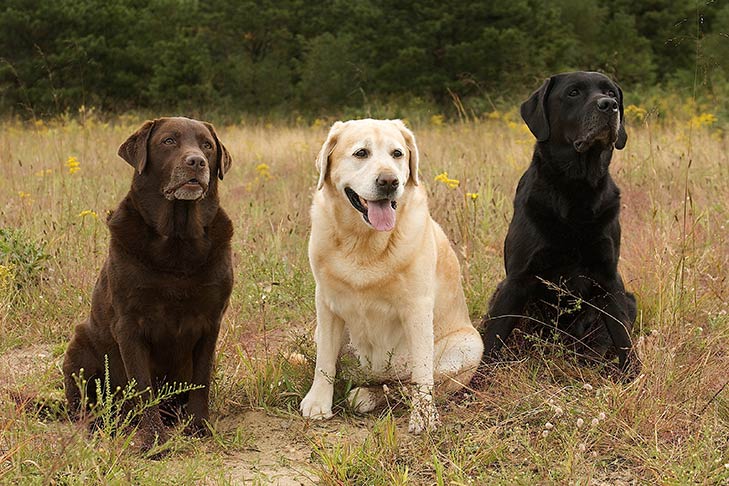
Labrador Retrievers rank among the most popular dog breeds globally. They are medium to large-sized dogs known for their friendly and outgoing nature. Labs are highly intelligent, making them easy to train and great companions for families.
Reasons why they are good with children:
Labradors are known for their patience and gentle demeanor, making them perfect for families with children. They are playful and enjoy being part of family activities. Their friendly and non-aggressive nature means they get along well with kids of all ages.
Care and maintenance tips:
Labradors require regular exercise to keep them healthy and prevent obesity. Regular walks, playtime, and mental stimulation are crucial. They have a short double coat that needs weekly brushing to control shedding. Regular vet check-ups, vaccinations, and a balanced diet are crucial for their well-being.
Golden Retriever

Golden Retrievers are friendly, intelligent, and devoted dogs. They have a beautiful golden coat and a friendly disposition, making them one of the most popular family pets.
Reasons why they are good with children:
Golden Retrievers are incredibly patient and gentle, making them excellent companions for children. They are playful, loyal, and enjoy being involved in family activities. Their calm and friendly nature helps them adapt well to households with kids.
Care and maintenance tips:
Golden Retrievers need regular exercise to maintain their health and prevent boredom. Their thick double coat needs regular brushing to prevent matting and minimize shedding. Proper nutrition, regular vet visits, and consistent training are important to keep them happy and healthy.
Beagle

Beagles are small to medium-sized dogs with a curious and friendly nature. They are known for their keen sense of smell and are often used as detection dogs.
Reasons why they are good with children:
Beagles are social and love being around people, making them great companions for children. They are playful, energetic, and enjoy engaging in activities with kids. Their friendly and gentle temperament ensures they get along well with young family members.
Care and maintenance tips:
Beagles require regular exercise to manage their energy levels and prevent obesity. They have short coats that are easy to groom with regular brushing. Beagles are prone to ear infections, so regular ear cleaning is necessary. Proper nutrition and regular vet check-ups are important for their overall health.
Pug
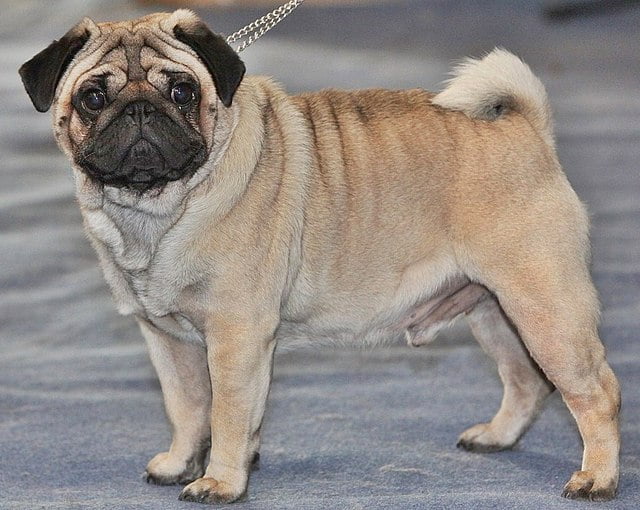
Pugs are small, sturdy dogs with a distinctive wrinkled face and a charming personality. They are renowned for their playful and affectionate nature.
Reasons why they are good with children:
Pugs are gentle and patient, making them excellent companions for children. They love playing and cuddling with kids. Their small size makes them ideal for families living in apartments or houses with limited space.
Care and maintenance tips:
Pugs require moderate exercise to keep them fit and prevent obesity. They have a short coat that needs regular brushing to reduce shedding. Pugs are prone to respiratory issues, so it’s important to avoid excessive heat and exertion. Regular vet visits, proper nutrition, and grooming are essential for their health.
Boxer
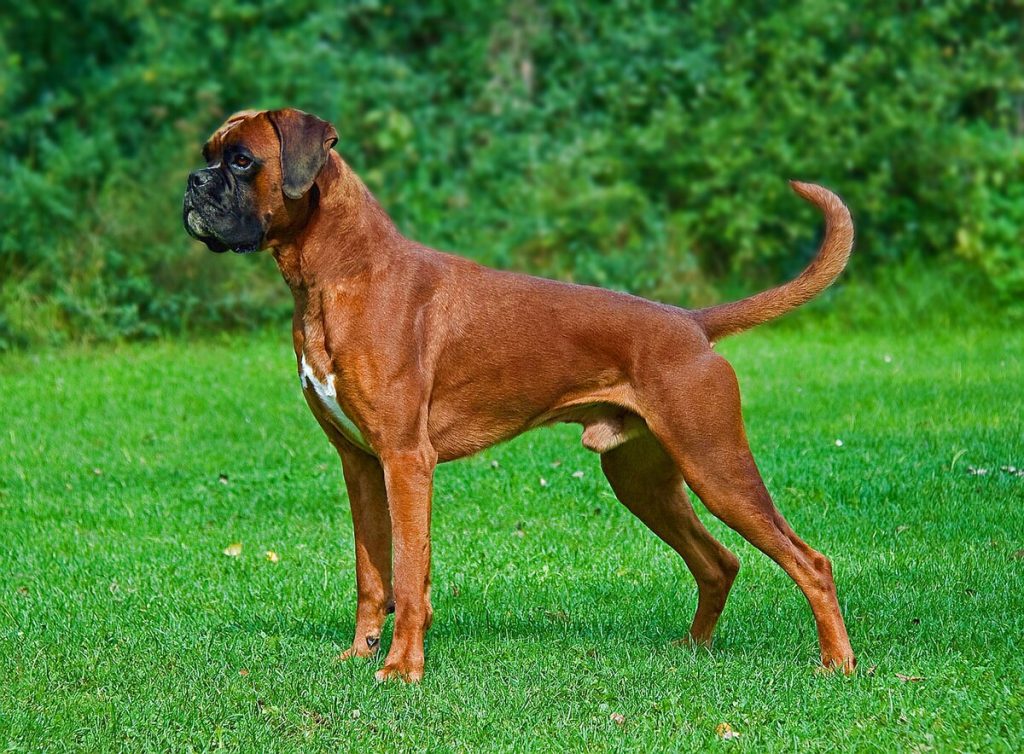
Boxers are medium to large-sized dogs recognized for their energetic and playful nature. They have a strong build and a short, smooth coat.
Reasons why they are good with children:
Boxers are known for their loyalty and protective nature, making them great family dogs. They are playful, energetic, and enjoy spending time with children. Their patient and affectionate demeanor ensures they get along well with kids.
Care and maintenance tips:
Boxers require regular exercise to burn off their energy and stay healthy. They have a short coat that is easy to maintain with regular brushing. Proper training and socialization are important to manage their energy levels and ensure good behavior. Regular veterinary check-ups and a balanced diet are crucial for their well-being.
Cocker Spaniel
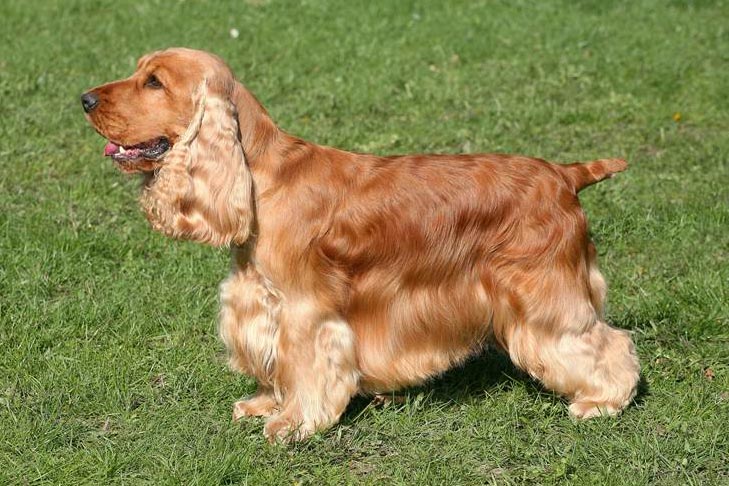
Cocker Spaniels are medium-sized dogs with a silky coat and expressive eyes. They are celebrated for their friendly and gentle nature, making them superb family pets.
Reasons why they are good with children:
Cocker Spaniels are affectionate and enjoy being around people, making them great companions for kids. They are playful, patient, and gentle, ensuring positive interactions with children of all ages.
Care and maintenance tips:
Cocker Spaniels require consistent exercise to maintain their health and happiness. Their long, silky coat requires frequent grooming to prevent matting and tangling. Regular ear cleaning is essential to prevent infections. A balanced diet and regular vet visits are important for their overall well-being.
Shih Tzu
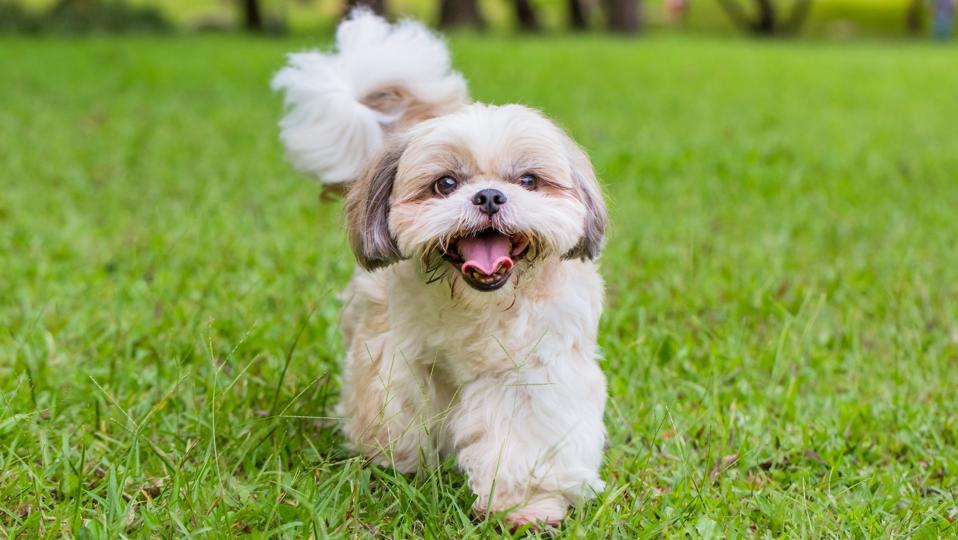
Shih Tzus are compact, robust dogs with a distinctive long, flowing coat. They are celebrated for their friendly and affectionate nature.
Reasons why they are good with children:
Shih Tzus are gentle and loving, making them great companions for children. Their compact size makes them ideal for families residing in apartments or homes with limited space. They enjoy playtime and cuddling with kids.
Care and maintenance tips:
Shih Tzus require regular grooming to maintain their long coat, including daily brushing and regular baths. They need moderate exercise to stay healthy and happy. Proper nutrition, regular vet check-ups, and dental care are essential for their overall health.
Basset Hound
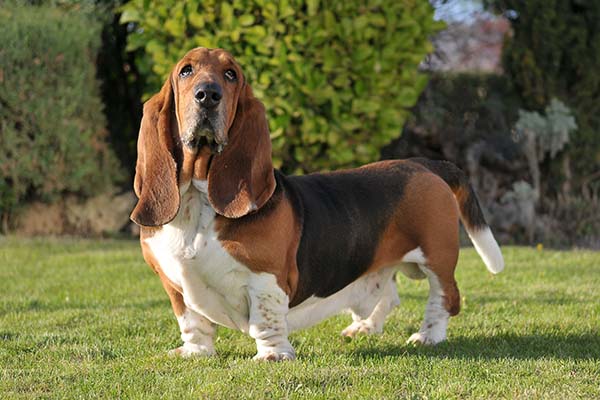
Basset Hounds are medium-sized dogs with long ears and a distinctive droopy expression. They are renowned for their calm and friendly demeanor.
Reasons why they are good with children:
Basset Hounds are patient and gentle, making them excellent companions for children. They enjoy being around people and are known for their calm demeanor. Their friendly nature ensures they get along well with kids.
Care and maintenance tips:
Basset Hounds require regular exercise to prevent obesity and keep them healthy. Their short coat is easily managed with regular brushing. Due to their long ears, regular ear cleaning is necessary to prevent infections. A balanced diet and regular vet visits are important for their well-being.
Cavalier King Charles Spaniel
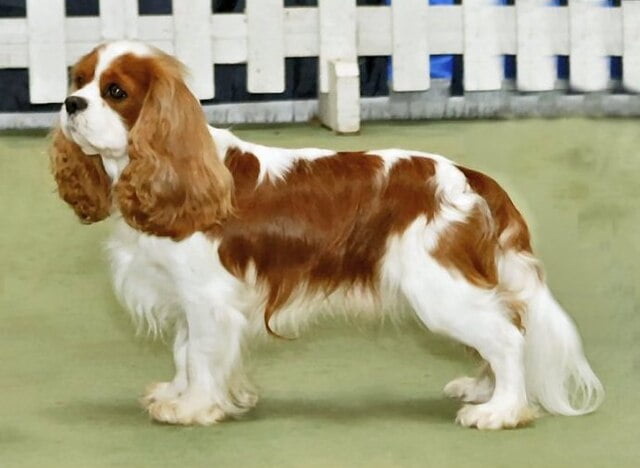
Cavalier King Charles Spaniels are small, elegant dogs with a silky coat and a friendly expression. They are celebrated for their loving and gentle demeanor.
Reasons why they are good with children:
Cavalier King Charles Spaniels are loving and enjoy being around people, making them great companions for children. They are playful, gentle, and patient, ensuring positive interactions with kids of all ages.
Care and maintenance tips:
Cavalier King Charles Spaniels require regular exercise to stay healthy and happy. Their silky coat needs regular brushing to prevent matting. Regular vet check-ups, proper nutrition, and dental care are essential for their overall health.
Dalmatian
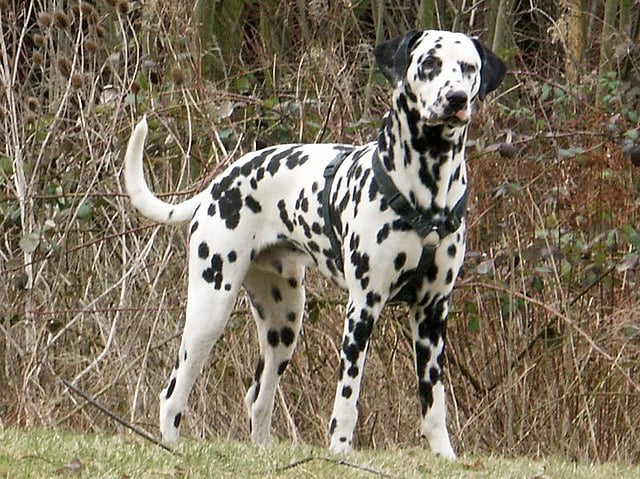
Dalmatians are medium-sized dogs with a distinctive spotted coat. They are known for their energetic and friendly nature.
Reasons why they are good with children:
Dalmatians are playful and energetic, making them great companions for active children. They delight in participating in family activities and are recognized for their loyalty and affectionate disposition. Their friendly demeanor ensures they get along well with kids.
Care and maintenance tips:
Dalmatians require regular exercise to burn off their energy and stay healthy. Their short coat requires regular brushing for maintenance. Effective training and socialization are crucial to manage their energy levels and promote good behavior. Routine veterinary check-ups and a balanced diet are vital for their overall health.
Tips for Introducing a Dog to Your Family
Preparing your home for the new dog:
Before bringing a dog home, ensure you have all the necessary supplies, including a bed, food and water bowls, toys, and grooming tools. Create a designated space for the dog to feel safe and comfortable.
Initial introductions between the dog and children:
Introduce the dog to your children in a calm and controlled environment. Allow the dog to approach the children at its own speed. Teach kids to be gentle and respectful of the dog’s space.
Establishing routines and boundaries:
Set up a consistent routine for feeding, walking, and playtime. Establish boundaries for where the dog can and cannot go in the house. Consistency helps the dog adjust and feel secure.
Encouraging positive interactions:
Supervise interactions between the dog and children, especially in the beginning. Encourage gentle petting and play. Use treats and praise to reward positive behavior and reinforce good interactions.
Caring for Your Child-Friendly Dog
Proper nutrition and feeding schedules:
Provide a balanced diet appropriate for your dog’s age, size, and breed. Stick to a regular feeding schedule to maintain a healthy weight and prevent overeating.
Regular exercise and mental stimulation:
Ensure your dog gets regular exercise to stay fit and mentally stimulated. Daily walks, playtime, and interactive toys help keep your dog active and happy.
Grooming and hygiene practices:
Regular grooming, including brushing, bathing, and nail trimming, is essential for your dog’s health. Keep their ears clean and teeth brushed to prevent infections and dental issues.
Regular vet visits and vaccinations:
Schedule regular vet check-ups to monitor your dog’s health and keep up with vaccinations. Preventative care, such as flea and tick treatments, is also important.
Training and socialization tips:
Consistent training helps your dog learn good behavior and commands. Socialize your dog with other people and pets to ensure they are well-adjusted and friendly.
Common Challenges and How to Overcome Them
Handling behavioral issues:
Address behavioral problems, such as chewing or barking, with positive reinforcement and training. Identify the cause of the behavior and provide appropriate solutions, like chew toys or training sessions.
Balancing dog care with a busy family schedule:
Create a schedule that includes time for dog care, such as feeding, walking, and playtime. Involve all family members in caring for the dog to share responsibilities.
Ensuring safety and preventing accidents:
Educate children on how to safely interact with the dog. Supervise playtime to prevent accidents. Secure potentially dangerous items and areas in the house to keep the dog safe.
Dealing with allergies and health concerns:
If a family member has allergies, choose a hypoallergenic breed or maintain a clean home to reduce allergens. Regular vet visits and proper care help manage health concerns and keep your dog healthy.
Conclusion
Choosing a child-friendly dog breed can bring immense joy and benefits to a family. By considering factors such as temperament, size, and care needs, you can find the perfect furry friend for your home. A well-chosen dog can become a loving and loyal companion for your children, teaching them responsibility and providing endless happiness. Research thoroughly and choose the best breed that suits your family’s lifestyle and needs.